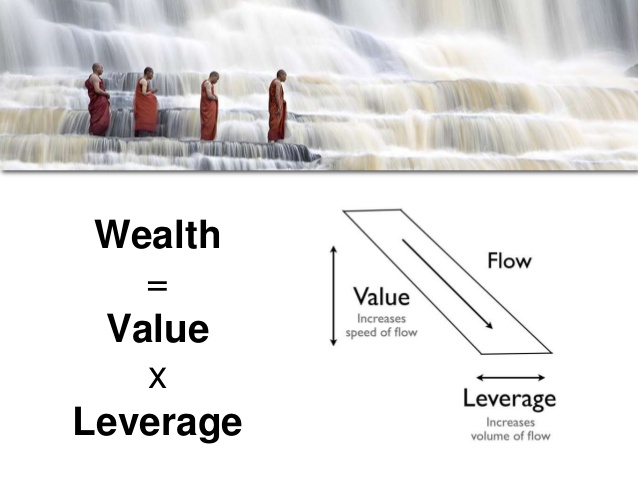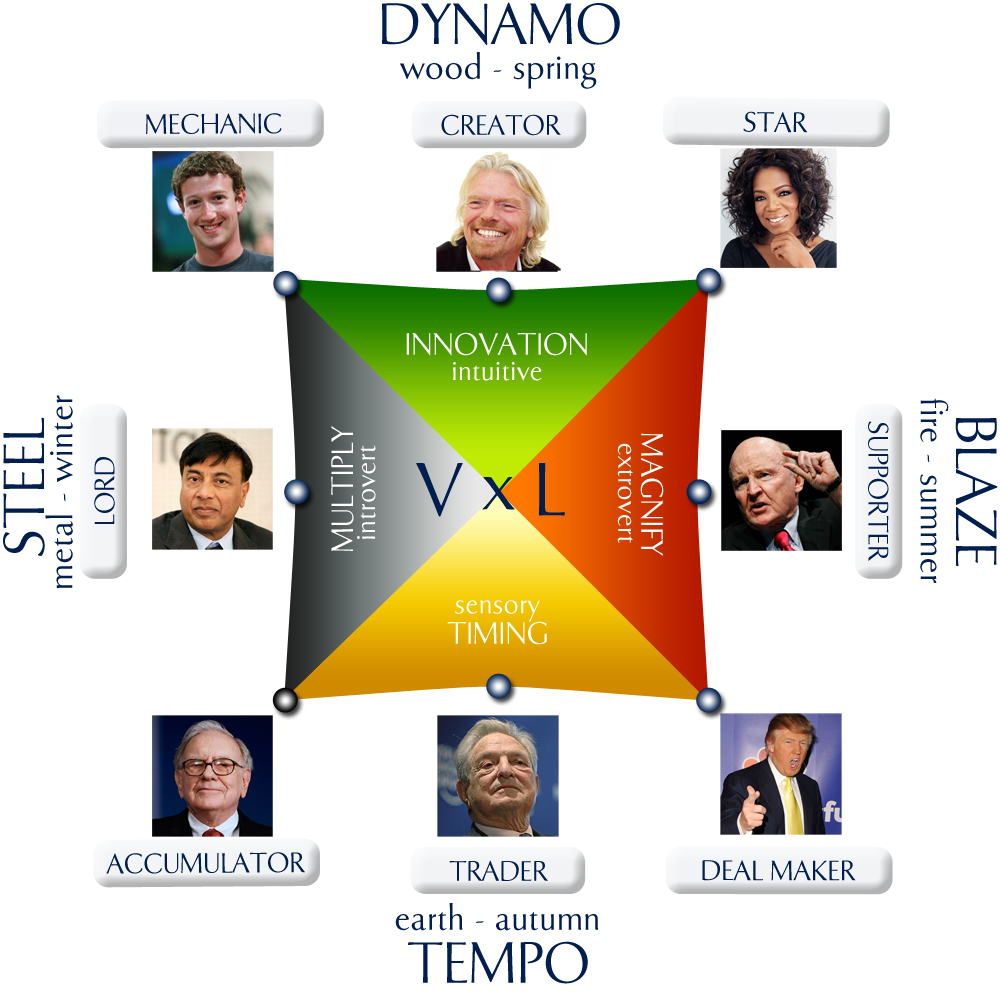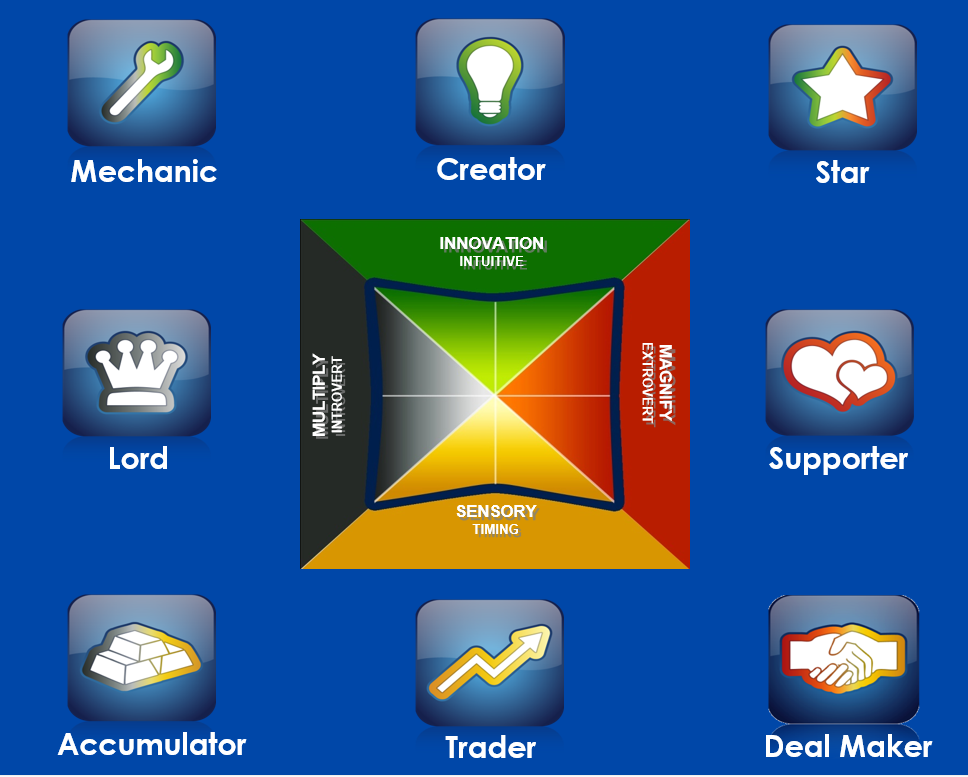Introduction
The Wealth Dynamics profiles are the gateway to a more productive state called ‘flow’.
Flow can be thought of as the path of least resistance, where you add the most value and get the most done.
Each of the Wealth Dynamics profiles has its own strengths and challenges.
When working by yourself there is little you can do except understand why certain tasks and roles drain you, while other jobs excite and energise you.
Yet no one truly works alone.
Everyone has a group or team of partners, clients and suppliers.
It is in the team where the Wealth Dynamics profiles become extremely useful to help a team to gel together and spot potential opportunities to work better.
As each of the Wealth Dynamics profiles has its own strengths and challenges, they can be used together in a team setting to cover potentially challenging tasks and ensure that each team member gets into and stays in flow.
The Wealth Paradox
Have you noticed how for some people, no matter how much money they get, it just disappears?
Whereas for many wealthy people, you can take all their money away and it comes right back again.
This is best explained by the ‘Wealth Paradox”, which states:
“The more money you have, the more opportunities you have to lose it.”
Without true wealth, all the money that flows through you will disappear.
So how do we define wealth?
Roger James Hamilton defines wealth like this:
“Wealth isn’t how much money you have. Wealth is what you’re left with if you lose all your money.”
Creating A River
Roger is talking about how Creators should not focus at chasing water upstream, but creating a river of flow.
There are trillions of dollars flowing around our planet every day, so you don’t need to make money; you simply need to direct it.
“Wealth isn’t about making money. It’s simply about good plumbing.”
We each have a natural way to create the river, and this is how the Wealth Dynamics square is formed.
This becomes easier to understand when we see the wealth equation.
The Wealth Formula
There are rules to this wealth river, and this is the Wealth Formula:
WEALTH = VALUE x LEVERAGE

Water always flows from high ground to low ground.
Money always flows from high value to low value.
Whoever values something more will be happy to pay for it, and whoever values the money more will happily take the money.
Value determines the speed of money flow (the more value, the steeper the river and the faster the money will flow).
Leverage is the width of the river, and so determines the volume of money flow.
If I had a widget that I sell for $100, I can double money flow by increasing value (a widget worth $200) or increasing leverage (two widgets worth $100 each).
All Wealth Creators intuitively understand how to grow their river.
The Opposites of Value and Leverage
What few of us are taught is that there are two opposites to value and two opposites to leverage, and we are each more natural at one than the other.
Intuitive thinkers create value through innovation (create new things), while Sensory thinkers create value through good timing (trade the markets).
Introverts leverage value through multiplying (making it simple and make many).
Extroverts leverage value through magnifying (making it complex, and only one).
These four make up the sides of our square.
What is the purpose of the Wealth Dynamics Square?
The Wealth Dynamics Square gives us the relationship between the eight Talent Profiles.
Think of it like an eight-sided mountain, where there are different rivers flowing down each side.
Each of us has our own flow, which naturally links our dreams to our reality.

The square shows the two opposites in the way we think and the way we act.
Some of us think more with our ‘heads in the clouds’, where we create value through innovation.
This is the ‘Dynamo’ energy on the top of the square. Some of us think more with our ‘ear to the ground’, and are more ‘sensory’, creating value through timing. This is the ‘Tempo’ energy at the bottom of the square.
Some of us act more through people, and are more extroverts.
The natural way to leverage is to magnify.
Some of us act more through data, and are more introverts.
Their natural way to leverage is to multiply.
The eight Talent profiles fit around the square, each with a different balance of how they most naturally think and act.
You will find that everyone has a profile and a natural path to success.
These four energies are also related to the four seasons, spring, summer, autumn and winter.
The Eight Wealth Dynamics Profiles

CREATOR “Creating a Better Product”
Creators are great at getting things started, and terrible at finishing.
They are the high in Dynamo energy, and are always using their quick thinking and imagination to get out of trouble.
Their flow comes from expressing their creativity in valuable ways.
Creators can’t resist creating.
They keep creating long after they’ve run out of resources, money, and other people’s patience.
In fact, they have their greatest creative breakthroughs after most others would have given up.
Before Walt Disney’s first animated movie was finished, his distributor went bankrupt.
Before his second movie was finished, he ran out of money himself.
To produce the now famous “Steamboat Willie” featuring Mickey Mouse in 1927, strapped for cash, he wrote to his brother Roy: “Slap a big mortgage on everything we got and let’s go after this thing in the right manner.”
Many Creators fail because of their over- optimism as to what their business and their team can achieve.
This optimism has led many to take on far too much, leaving them little time to do what they do best.
Successful Creators have delegated everything except the creative process itself – and they focus on creating new products, or new companies, while others take care of the day- to-day business.
Successful Creators, who share a common strategy to achieve their successes, include Thomas Edison, Walt Disney, Bill Gates, Steve Jobs, and Richard Branson.

STAR “Creating a Better Brand”
Stars are excellent promoters and are high in both Dynamo and Blaze energy.
They are quick on their feet and can sometimes seem to dominate the conversation.
Stars are best when they use their sparkle to shine the light on others more than themselves.
The Creators set the stage, and the Stars steal the show.
Stars get their most valuable feedback in the limelight, and find their flow while on their feet.
As a result, they are able to evolve their attraction on the fly, and it is their personal magnetism that is their greatest value.
Stars are naturals at creating a unique identity for themselves.
It is their personal brand that attracts others.
By magnifying their brand, they quickly magnify their attraction.
Failed Stars do not realise this and have been attempting to build their wealth by improving their products, their systems or their teams – none of which come as naturally.
Stars also get frustrated that others can’t do what they can do, and so make poor managers without the right deputies.
Successful Stars are happy to leverage on the products and platform of others in order to perform their magic.
They lead from the front with their name shining in lights, while others count the receipts.
Successful Stars, who share the same winning (and, often losing!) formulas in their path to success, include Oprah Winfrey, Martha Stewart, Arnold Schwarzenegger, Paul Newman and Amitabh Bachchan (India’s number one Superstar).

SUPPORTER “Leading the Team”
Supporters are excellent with people, and will always be found in the middle of the party.
They are strong Blaze energy and often distracted supporting others.
Their flow comes from being actively involved in leading others in fun and worthwhile adventures
While Stars are busy shining, Supporters are busy lighting up others. Supporters are the strongest leaders, as they can translate value into action through people.
They are masters at energising teams by giving them the confidence they need to succeed.
They supply the glue without which great plans would crumble.
Many Supporters struggle to find the right business to start, despite their fabulous network.
This is because they are asking themselves what business they should start, when they should be asking themselves which value creator they should support.
Steve Ballmer has led Microsoft, giving Bill Gates the space to create, and his shares in Bill’s company now give him a net worth of over $1 billion.
Some of the most successful Supporters can also be found in their own businesses – such as in public relations, headhunting and consulting where others will pay big bucks for access to the people they know.
Where others would take months to find the right person, it often takes Supporters just one phone call.
Notable Supporters include Jack Welch, Michael Eisner, Steve Case and Meg Whitman.

DEAL MAKER “Bringing People Together”
Deal Makers are strong in Blaze and Tempo energy, so they are down-to- earth.
They have a strong sense of timing and loyalty, and always make sure everyone is OK.
They are best when connecting people and ideas together for everyone’s benefit.
Like Stars and Supporters, Deal Makers leverage by magnifying out in front.
While Stars are high in the sky, Deal Makers have their ear to the ground: Creating value through timing, not innovation, and living in the present.
Successful Deal Makers tend to catch the imagination of the business world, with their sweeping gestures that make millions in a moment.
Of all the profiles, the Deal Makers rely most on the relationships around them.
While a Star’s value grows as they become less accessible, a Deal Maker’s value grows as they become more accessible.
They are constantly on the phone and on the move.
They create their wealth by spotting connections in the market.
Once the deal is done, the new value created enriches everyone involved.
Struggling Deal Makers are often stuck trying to start a business or caught up in detail, as the idea of wheeling and dealing, wining and dining, just sounds like too much fun!
Every successful Deal Maker has picked a niche from which to attract the best deals in their market.
Celebrated Deal Makers include Donald Trump, David Geffen and Rupert Murdoch.

TRADER “Buying Low Selling High”
Traders have their ear-to-the-ground, with strong Tempo energy.
They will always know who upset whom, and how to keep things fair.
Quiet by nature, they will often only share if asked, and find their flow in keeping the peace and keeping things on time.
Traders are masters of timing but, unlike Deal Makers who make their money by bringing assets and resources together, Traders will buy and sell the assets and make their money from the spread.
Extrovert Traders will do this where they can influence the price through hard bargaining.
Introvert Traders prefer to trade through analysis rather than face-to-face bidding, and include many of today’s successful market traders.
While Creators need to immerse themselves to create their wealth, Traders need to detach themselves.
If markets were symphonies, the Creators are the composers while the Traders are the conductors.
Value comes from waiting for and surfing the right wave while others get caught in the current.
Many failed Traders have never taken control of the trade.
As reliable and hard-working employees, they may see either the buy side or the sell side of a transaction within the company they work for, but often never the two together.
Only when they are in control of both sides will Traders become aware of the natural talent that they have.
Famous Trader profiles include George Soros, Peter Lynch, John Templeton and Jim Rogers.

ACCUMULATOR “Collecting Appreciating Assets”
Accumulators are excellent project managers and researchers.
They have strong Tempo and Steel energy, and are always careful in their work.
Don’t expect them to be overly creative. Their flow comes from collecting and organising what’s already there.
While Traders create wealth by accelerating money flow, Accumulators create wealth by decelerating it.
Rather than making money by buying and selling off waves, they make money by buying and holding on rising tides.
Steady and dependable, if the profiles were compared to a football team, the Stars would be the strikers while the Accumulators would be the keepers.
While Stars are quick to spend, Accumulators are quick to save.
Accumulators often fail as a result of keeping too much to themselves, rather than building the advocates who will network on their behalf.
They rarely act on impulse, and fail if they have not set the criteria to take action.
Accused of procrastinating, they simply need more data to make an informed decision.
Once Accumulators connect to the right team, they are quickly uplifted while keeping the team grounded.
They ensure that everything is in order and that what needs to get done gets done on time.
Successful Accumulators are happy to remain down-to- earth, holding the kite strings while others fly high.
Successful Accumulators include Warren Buffett, Benjamin Graham, and Li Ka Shing.

LORD “Controlling Cash Flow Assets”
Lords are great at the detail, with strong Steel energy.
They won’t be the loudest voice in the room, but are the best at researching and studying information and coming up with considered decisions.
They are best when looking after all the details.
Lords love the detail, and are renowned for their thrift.
They can squeeze out the cash flow from assets without needing to own the assets.
Rockefeller became a billionaire in the oil industry without needing to own a single oil well.
Mittal has become a billionaire in the steel industry without needing to own a single mine.
Whether commodity Lords or land Lords, they have the patience to collect and crank up every cent of cash flow they find.
While extrovert Supporters value people over numbers, introvert Lords value numbers over people, and don’t have time for politics or niceties.
Lords love certainty and hate risk.
They prefer to keep to themselves, and those who haven’t yet found their wealth often fail to see their analytical skills, risk aversion and need for control as their greatest strengths.
Successful Lords are unrelenting once they find their niche, with the ability to consistently generate cash flow without the need for either innovation or timing, weathering market conditions and acquiring the competition until they are dominating entire industries.
Successful Lords include Andrew Carnegie, Lakshmi Mittal, and Sergey Brin.

MECHANIC “Creating a Better System”
Mechanics are the best at completing things.
They are high on Steel and Dynamo energy.
As perfectionists they sometimes seem to take longer to get things done.
Their flow comes from taking things apart and finding better ways to put them back together.
If Creators need to have their head in the clouds, then Mechanics need to have their finger in the pie.
While Creators are great at starting things, Mechanics are great at finishing things.
They are perfectionists, which is why they cannot resist finding ways to do things better.
While Stars twinkle, Mechanics tinker.
They get hands-on with their systems and prefer to study how to improve things with their hands dirty.
Many Mechanics have yet to get going because they are still trying to figure out what business to start.
Many Mechanics have companies with better systems than their competitors, but they have not leveraged these systems with stronger products produced by others, or their business is limited by their autocratic management style and high staff turnover.
Successful Mechanics remain hands-on, fine- tuning their systems long after they have delegated many other areas of their business to others.
This is where they see the greatest results, and where they gain the most satisfaction.
Successful Mechanics include Henry Ford, Ray Kroc, Sam Walton, Ingvar Kamprad (IKEA founder), and Michael Dell.
